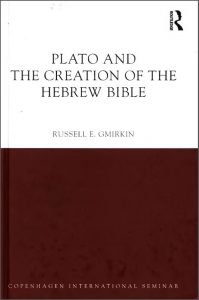This post continues the discussion of Russell Gmirkin’s Plato and the Creation of the Hebrew Bible. All posts in the series can be accessed in the archive.
–o0o–
 After discussing the popularity of Greek foundation stories and the appearance of the same genre in the Pentateuch, Gmirkin looks at one more type of narrative that is found in common between Greek literature and Primary History (Genesis to 2 Kings). The point is that the same type of story is said to be alien to Near Eastern literature so apparently the only known model for the biblical narratives is found in the Greek writings of Thucydides, Plato and Aristotle.
After discussing the popularity of Greek foundation stories and the appearance of the same genre in the Pentateuch, Gmirkin looks at one more type of narrative that is found in common between Greek literature and Primary History (Genesis to 2 Kings). The point is that the same type of story is said to be alien to Near Eastern literature so apparently the only known model for the biblical narratives is found in the Greek writings of Thucydides, Plato and Aristotle.
Gmirkin’s double point is that (a) Near Eastern political systems reportedly were restricted to absolutist monarchies and that (b) it is not until the literature of the Greeks from the fifth century on that we read “historical” accounts of evolution from patriarchal and “democratic” types of governments to monarchies along with expressions of views about the relative strengths and weaknesses of the different systems.
Gmirkin appeals to the Babyloniaca of Berossus to argue that Mesopotamian traditions knew only of the institution of kingship:
In Mesopotamian traditions, there was no question of an evolution of governmental institutions: kingship was present from the beginning, part of the gifts of civilization revealed by the gods to the first generation of humankind. This is fully illustrated by the Babyloniaca of Berossus, in which unenlightened humanity as originally created was no better than the animals. Then the gods sent Oannes, an apkallu, to teach humankind the arts of civilization, including the establishment of kings and cities (Berossus FGrH 680 Fib). In Berossus and the late Babylonian sources he used, the ten generations before the flood were each ruled by a famous king from a prominent Mesopotamian city (Berossus FGrH 680 F3b, discussed at Gmirkin 2006: 107-8). After the flood destroyed almost all of humankind, the institution of kingship was immediately restored among the survivors (Berossus FGrH 680 FF 3b, 4b, 5a). (Gmirkin, p. 231, my bolding in all quotations)
I think Gmirkin could have been more nuanced here, however, by acknowledging other ancient Near Eastern evidence prior to Berossus. Some studies of ancient Sumerians and early Mesopotamian political systems have indeed at times suggested that nascent forms of democracy were to be found in these settings. I can understand disputes arising over the meaning of the word “democracy” but there are a number of studies that at least point to various regions in the ancient Near East (Mesopotamia, Anatolia including an Assyrian colony, the Levantine people including the Phoenicians, and even Egypt) in which prominence is given to popular or oligarchic assemblies, council elders, as well as kings. See, for example,
- Isakhan, Benjamin. “Engaging “Primitive Democracy”: Mideast Roots Of Collective Governance” Middle East Policy, Vol. 14, No. 3 (2007).
Isakhan writes of ancient Mesopotamia (with my bolding):
Overwhelmingly, history tells us of the megalomaniacal kings and their grand menacing empires that rose out of these early developments to conquer and dominate the region by fear and bloodshed.72 However, there is also a growing understanding that the history of modern thought, usually understood to have begun around 400 B.C. in Greece, can be traced further back to early Mesopotamia.73
Evidence for such advanced thinking is found in the early myths and legends of ancient Mesopotamia, where we find the inner functioning of the Ordained Assembly of the Great Gods. . . . Generally, it was called together when the gods needed to make a decision; they would listen and debate until the pros and cons of each issue were clarified and a virtual consensus emerged.75 When the council reached full agreement, the seven senior gods would announce the final verdict, and each of the members would voice approval with a “let it be.”76
You can check the footnotes from that article itself on the linked article page above.
As the city states grew in size and warfare among them became all the more common despotic kings did indeed emerge and were naturally reluctant to give up their powers. Yet, Continue reading “Plato and the Hebrew Bible: Political Evolution in Literature”
